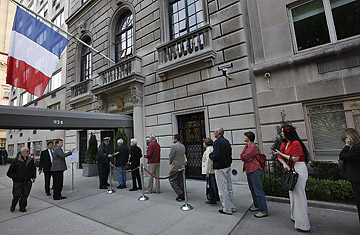
French citizens wait to vote in in their Presidential elections outside the French consulate in New York, May 5, 2007.
At 8 p.m., local time, when Nicolas Sarkozy was declared the next President de la Republique, there was a unanimous explosion of joy inside the Alliance Franaise. Chanting and dancing, these talented and ambitious young expatriates were celebrating the triumph of the principles of hard work, individuality and merit in a country whose dysfunctional economy had forced them to choose a voluntary exile in order to pursue their career potential. To them, including myself, Sarkozy represents the hope that one day, they will be able to chase their entrepreneurial dreams in the land of their birth.
Much of the world's media describes Sarkozy as an atypical Frenchman, not only because of his Hungarian origins, but more importantly, because he is a passionate believer in hard work, individual enterprise and reward for ambition — an admirer, in other words, of the economic and social dynamism of the United States. As a French person who has studied in one of America's premier universities and is now interning at one of its most respected news magazines, I am pained by the assumption that there's something not typically French about the virtues promoted by Sarkozy. The many thousands of French expatriates working in America's biggest banks and corporations, or running their own businesses in its larger cities — and the hundreds of thousands more doing the same across Europe and Asia — are eloquent proof that they are indeed very French qualities. But those qualities have been discouraged and suppressed by France's economic and social paralysis.
French workers, by law, are not required to work more than 35 hours a week. Strikes and street demonstrations have become an integral part of French life — millions of students last year protested against labor-law reforms aimed at reducing youth unemployment by easing the bureaucratic restrictions that discourage companies from creating new jobs. The world was shown an image of France as a nation paralyzed by a fear of change and risk.
That image, however, is not some deep-seated French mentality; instead it is the product of the same economic malaise that has led hundreds of thousands of young and talented French citizens to leave France and seek success abroad. France has the slowestgrowing large economy in Europe, the fastest-rising public debt in western Europe over the past ten years, and its 22% youth unemployment rate is one of the highest on the continent. Sarkozy was chosen by an electorate looking to cure the malaise. Assuming he has the courage his predecessors have not had to withstand the inevitable protests and demonstrations, the President-elect will liberalize labor markets, cut taxes, relax the 35-hour-workweek laws and create more flexible contracts.
In the afterglow of Sarkozy's election, my country's economic and political future looks more promising than at any time that I can remember — at least from the other side of the Atlantic. If he succeeds in putting the economy back on track, France will no longer be seen as "the sick man of Europe," but can instead reemerge as a European and global leader in confronting the challenges of the 21st century. To the French and their Diaspora, Sarkozy has offered nothing less than a France nouvelle. Let's just hope that in the process, he will soften up his tough stance on immigration and will act as the President of all the French people, as he promised in his victory speech.
